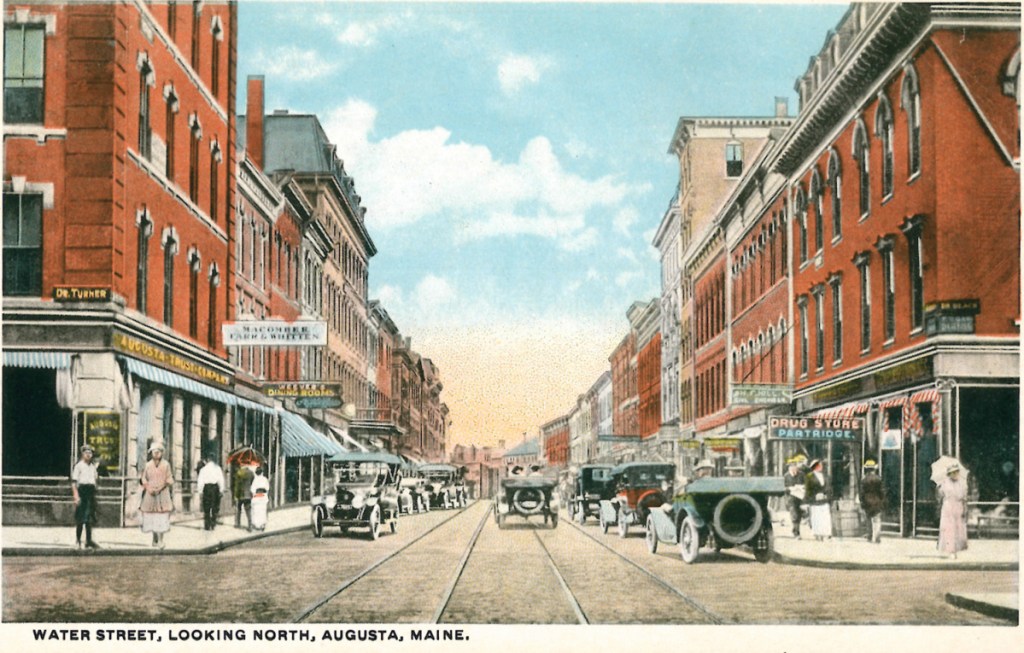When I returned to Maine in 1984, people in Augusta were still mourning the loss of the D.W. Adams department store, which had closed for good two years earlier. But the building it had occupied since 1920 — the Bussell & Weston block at 190 Water St. — is still one of the most handsome in an architecturally distinguished downtown, with most of it now on the National Register of Historic Places.
Since then, Water Street has had a lot of ups and downs — perhaps more downs than ups. Around the time of the Adams closing, Bill Burney, later the mayor, led a short-lived effort to enclose the main block into a kind of indoor mall, named, perhaps unfortunately, “Downstreet.”
By 1990, the city planning department had pretty much abandoned the Water Street district altogether, preferring to spend its time on shopping malls and business parks — a decision especially regrettable because a movement called “the new urbanism” was then gathering steam, from big cities to small ones.
Now, Water Street is showing distinct signs of life, with half a dozen eating and drinking establishments creating a nightlife that was previously reserved, on the Kennebec River, for Hallowell and Gardiner.
And the City Council is considering undoing one of the several short-sighted decisions that nearly cost Augusta its downtown — the one that made traffic on the central block, between Market Square and Bridge Street, one-way.
According to a new study, reversing the process would be surprisingly easy and cheap. In contrast to Waterville, which studied a much more complicated reworking of its Main Street and Front Street downtown routes with a price tag of $4.4 million, making Augusta’s Water Street fully two-way would cost only $75,000.
While the Waterville plan hasn’t attracted much interest — in part because of the cost — Augusta’s Water Street plan appears fully viable. That doesn’t mean, of course, it will be welcomed by everyone.
When I first asked a prominent business owner about restoring two-way traffic to Water Street, he called it “a no-brainer.” And businesses along Water Street, especially those involved in restoring it, are largely in favor, though the Augusta Downtown Alliance has yet to take a position.
There are worries about losing a few parking spaces, but all indications are that, since the addition of the garage behind Commercial Street, there’s plenty of parking space. Fire Chief Roger Audette expressed concern about fire access being obstructed, but since the only stoppage on this section is the traffic light at Bridge Street, it seems unlikely to have any significant effect.
Absent so far in the debate has been the very group that would benefit most from a two-way street, and its resulting lower traffic speeds: downtown residents. Yes, there are many of them.
Almost unnoticed, there are at least 40 market-rate apartments downtown, another 25 before the Planning Board, and more in the offing. People really do want to live downtown, and, with the scores of subsidized units nearby, Augusta is finally re-creating a real community in what was once the heart of the city.
Speaking out at public hearings will be essential if resistance is to be overcome, and there always is some. Especially in Maine, where change is resisted, and tradition even more highly valued than in other states, there is never going to be community chorus of, “Great, let’s do it.”
So we will have to regard full two-way traffic on Water Street as an experiment, though it’s far from a radical one. The one-way section is really just one long block, less than 800 feet, bisected only by a single left turn onto one-way Oak Street.
Both ends of Water Street are already two ways, and no one has suggested changing them. Reprogramming the Bridge Street signals, painting some new lines, and adding directional signs, with perhaps a bit of paving, is all that needs to be done.
The geometry of the street is excellent; the sidewalks are sufficiently wide, and parking is more than adequate. If we want to splurge, embedded crosswalks would be a nice touch, replacing the painted crosswalks that are next to invisible during the six-month cold season.
There’s a reason why the phrases “one-way ticket” and “one-way street” have a fatalistic sound — they suggest endings rather than beginnings. Augusta is about ready for some new beginnings, in more ways than one.
A restored Water Street would truly be community-friendly, a phrase we use often, but rarely value highly enough. Yes, this will be an experiment — but I have no doubt it will be a successful one.
Douglas Rooks has been a Maine editor, opinion writer and author for 33 years. His new book, “Rise, Decline and Renewal: The Democratic Party in Maine,” is now available. He lives in West Gardiner, and welcomes comment at: drooks@tds.net
Send questions/comments to the editors.



Success. Please wait for the page to reload. If the page does not reload within 5 seconds, please refresh the page.
Enter your email and password to access comments.
Hi, to comment on stories you must . This profile is in addition to your subscription and website login.
Already have a commenting profile? .
Invalid username/password.
Please check your email to confirm and complete your registration.
Only subscribers are eligible to post comments. Please subscribe or login first for digital access. Here’s why.
Use the form below to reset your password. When you've submitted your account email, we will send an email with a reset code.